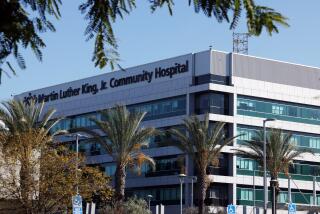A Reeling King/Drew Receives Huge Blow
- Share via
A national accrediting group Wednesday recommended pulling its seal of approval from beleaguered Martin Luther King Jr./Drew Medical Center, an extremely rare step that further threatens the public hospital’s survival.
Signaling that the medical center has failed to correct severe lapses in patient care, the national Joint Commission on Accreditation of Healthcare Organizations voted to begin the process of revoking King/Drew’s accreditation.
The proposed move is primarily a huge public relations blow for the Los Angeles County-owned hospital. But it also could have crippling practical effects, including the potential loss of physician-training programs and $14.8 million in private insurance contracts. Another less likely possibility is losing $200 million in annual federal funding if the hospital cannot assure government regulators that it meets their safety standards.
Los Angeles County supervisors vowed to appeal the decision. If the appeal were not successful -- as few are in these cases -- at least one supervisor said he feared that the loss of accreditation would ultimately lead to the hospital’s closure.
“How could we face the community in running a hospital if its accreditation had been pulled?” said Supervisor Zev Yaroslavsky. “How could the county or anybody take the risk?”
If King/Drew did lose its accreditation, it could reapply to get it back as one Washington, D.C., hospital did last year.
The deluge of bad news at King/Drew amounted to a “meltdown” that could imperil the large number of poor people in South Los Angeles who depend on its services, said Los Angeles City Councilman Martin Ludlow. “I don’t think people are grasping at how massive and catastrophic this is.”
In itself, losing approval from the Joint Commission would not force King/Drew to close because hospitals are licensed by state and federal regulators.
But it would add to tremendous pressures on the Willowbrook hospital, south of Watts.
The threat came in the same week that county supervisors announced a controversial proposal to close King/Drew’s trauma center, and federal regulators demanded new, outside management at the hospital. Supervisors said they had to shut down the costly trauma service to save the rest of the hospital.
Opposition has been mounting to the plan. On Wednesday, the Los Angeles City Council voted to oppose the closure of the trauma center, which treated 2,150 gunshot wounds and other life-threatening injuries last year.
“We were all shocked and surprised by the sudden decision of the supervisors to close the trauma center,” Councilwoman Janice Hahn said in a statement. “Let’s not forget the history of this hospital. It rose out of the ashes of the 1965 [Watts] riots.”
Council members said closing the trauma center would cost lives.
But several county supervisors and Dr. Thomas Garthwaite, director of the county Department of Health Services, said the Joint Commission’s recommendation reinforced their decision to close the trauma unit.
It is one of the most prestigious units of the hospital, but is expensive to run and requires a lot of staff. The resources, they said, were needed elsewhere.
“This shows that we have a hospital in crisis and we have to do whatever is necessary to save it,” said Supervisor Don Knabe.
Garthwaite said the accumulation of problems at King/Drew naturally raised the question of whether patients were safe there and whether it should be closed altogether. “None of the choices are ideal,” he said. “Certainly no one will rush to the front at other hospitals to take those patients in.”
For months, disclosures and sanctions against the hospital have been mounting. Several times, the federal government has threatened to cut off funding for lapses, including giving the wrong patients potentially toxic medications and using stun guns on mental patients.
They also have found that neglect by King/Drew’s staff contributed to the death of at least five patients last year.
Separately, the group that accredits physician training programs has ordered three of 18 programs at King/Drew closed.
Some people who depend on the hospital expressed disgust.
Tammy Green, 34, of Willowbrook, who delivered three children at King/Drew, said the hospital was allowed to fall into such a state because “we’re black and we’re poor.”
“I blame the whole system,” she said.
The Joint Commission accredits nearly 4,600 hospitals, accounting for about 80% in the nation. It has never before threatened King/Drew with a loss of accreditation. Just 11 hospitals have lost its seal of approval since 1998.
No other hospitals have been recommended for denial this year, said commission spokesman Mark Forstneger.
The Joint Commission’s decision was based on major problems identified during inspections in May and August. Inspectors found 14 serious problems during the May visit, and 17 more in August, the latter being enough to trigger the loss of accreditation.
The August problems included incompetent staff, failure to prevent hospital-acquired infections, inconsistent patient care, failure to maintain medical equipment and incomplete medical charts.
A final decision was expected by February. During its appeal, the hospital can argue only that the inspectors’ findings were wrong, not that the problems have since been fixed, commission officials said.
“They may have done 1,000 great things since then. They may have turned over their medical staff. They may have brought in great consultants,” said Joe Cappiello, the commission’s vice president for accreditation field operations. “That is not going to matter. The decision will be based on where they were and what their compliance was at the date of the survey.”
The loss of accreditation also could further endanger King/Drew’s ability to train medical specialists.
The rules of the Accreditation Council for Graduate Medical Education, the national group that oversees doctor training programs, specify that a hospital should be accredited by the Joint Commission. If a hospital loses that approval, the group will decide whether the Joint Commission’s findings hurt the training of doctors in each specialty individually.
King/Drew’s medical director, Roger Peeks, last week acknowledged the harm that could be caused by a loss of accreditation.
“I think it is bad from a public relations standpoint, and it’s hard to overcome that,” he said. “It will probably take years to overcome that. I think we could survive but I think it would be very hard.”
Outside experts agreed. A hospital needs accreditation “to stay competitive, to be recognized as a safe place where quality of care is important,” Cappiello said. “Accreditation is that public seal that demonstrates your commitment to quality.”
Experts say the Joint Commission has toughened its inspections in the last year after the organization was criticized by health advocates and politicians for being too forgiving of troubled hospitals.
The organization’s inspectors are now more aggressive. They pull active medical charts of patients, for instance, and backtrack to see if medications were given or whether lab work was done promptly.
Peter Bryan, chief executive of Kern Medical Center, a public hospital in Bakersfield, said the Joint Commission’s recommendation means that King/Drew is failing its community.
“I really feel for the community,” he said. “I don’t know what they are going to do down there. Is some access to care better than none? Maybe no access is better than some. Someone would have to go into Martin Luther King with a complete team and just clean house. Anything can be turned around if there is a collective will to make it happen.”
Greater Southeast Community Hospital in Washington, D.C., lost its accreditation in August 2003 after being faulted for substandard care. Four months later, the hospital won it back.
Glenn Krasker, an independent consultant hired by the hospital, said it was a very difficult undertaking.
“It was a lot of work,” Krasker said. “If they can get the right management team in there, then they can actually turn it around. Somebody’s going to have to step up to the plate and decide the viability of this hospital. Is their survival worth making some changes?”
*
Times staff writers Jessica Garrison and Monte Morin contributed to this report.
More to Read
Sign up for Essential California
The most important California stories and recommendations in your inbox every morning.
You may occasionally receive promotional content from the Los Angeles Times.










